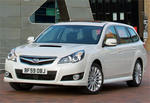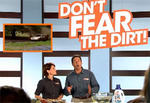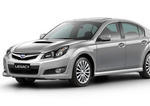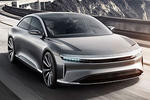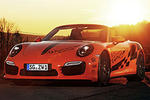
Subaru has unveiled today at the New York Auto Show the new 2010 Subaru Outback. The 2010 Subaru Outback comes with a choice between two engines: 2.5i with 170 hp and 170 lb-ft. and 3.6R with 256 hp and 247 lb-ft. The choice of transmissions offered with the 2010 Subaru Outback includes a Lineartronic CVT, a 5-speed automatic and a 6-speed manual gearbox. The Lineartronic CVT transmissions of the 2010 Subaru Outback is the first longitudinally mounted CVT system for AWD production vehicles.
The company promises the 2010 Subaru Outback offers an enlarged cargo capacity, enhanced comfort and a spacious interior.
The safety of the 2010 Subaru Outback is assured by the ABS, EBD, an electronic Hill Holder System and the company's Vehicle Dynamics Control (VDC) system.
The 2010 Subaru Outback price will be announced at a later date.
Subaru Press Release:
Fuji Heavy Industries Ltd. (FHI), the manufacturer of Subaru automobiles, today announced the world premiere of the all-2010 Subaru Outback (U.S. specifications) at the New York International Auto Show (press days on April 8 and 9, open to the public from April 10 through 19). The 2010 Subaru Outback will be introduced in the U.S. market as the 2010 Subaru Outback.


Since its debut in the U.S. in 1994, the Outback has earned a solid reputation as a unique crossover vehicle that blends the refined comfort, handling and convenience of a passenger car with the rugged off-road capability and versatility of an SUV. Featuring Subaru’s core technology, symmetrical All-Wheel-Drive (AWD), along with FHI’s original Horizontally- Opposed (BOXER) engine, the Outback is tagged as a Sport Utility Wagon and is a major contributor to Subaru’s U.S. sales.
Distinguished by crisp new styling, the fourth-generation Outback features a roomier cabin and
an expanded luggage/cargo compartment. And with the introduction of an all new chassis and the new Subaru Lineartronic CVT (continuously variable transmission), the 2010 Subaru Outback delivers enhanced performance, comfort and environmental considerations. From its reputation for reliability and driveability to higher fuel efficiency by Subaru’s advanced technologies, the Outback offers its occupants new levels of on- and off-road peace of mind.
Package
With body size and design features appropriate for the U.S. market, the new Outback has a greater road presence. Subaru engineers now offer occupants the roomiest cabin and cargo area and a more comfortable ride, and enhancements to conveniences that have characterized all of the Outback’s generations.
- The 2010 Subaru Outback is 50 mm wider and 105 mm higher than the previous model, and with ground clearance increased to 220 mm and a wider track, the vehicle projects a greater road presence. Front and rear overhang dimensions have been shortened by 90 mm and overall length by 20mm, but wheelbase has been increased by 70mm, which allows for greater rear seat legroom.
- Access to the rear cargo area is facilitated by a wide aperture rear hatch. Maximum cargo capacity has been increased and now provides easy accommodation of four large suitcases.
Exterior design
Clearly inheriting the dynamic crossover styling of its predecessors, the bolder and more distinctive silhouette of the new Outback projects a greater road presence.
- The upright grille is placed more prominently and in a higher position on the front end, which imparts to the vehicle a more SUV-like look. The distinct, three-dimensional shape of the headlamps, with square fog lamps positioned at both ends of the bumper, imparts a sharp, stable feel to the front face.
- The 2010 Subaru Outback also makes its road presence known by its ample bumper and distinctive side moldings as well as in its expressive wheel arches that embody power running through the AWD system.
- The D-pillars, re-envisioned to project bolder lines for this model, point to the Outback’s origins in the world of SUV design. The rear end of the vehicle, which seamlessly blends larger combination lights with rear garnishes painted the same color as the body and bumper, gives an impressive sense of volume.
- Underscoring its SUV-like versatility and accentuating its height, every Outback is outfitted with a newly redesigned roof rack. This innovative system stows its integral crossbars in the roof rails when they’re not needed, which helps to reduce a potential source of wind noise.
- Moldings around the windows accentuate the sleek design of cabin area with a quality feel.
Interior designs
A new interior design echoes the dynamic exterior lines and shapes and creates a more spacious cabin with a sense of quality.
- The new instrument panel, accentuated by sharp edges, creates the impression of more laterally-opened space in the front.
- A sense of powerful presence and fine quality is expressed in the center console shapes and in the decorative hairline finish on the surfaces of the console.
- The incorporation of a new electronic parking brake eliminates the need for a side brake lever and creates more space for the center console. The center console features two-cup holders arranged side by side, and the console box and arm rest are enlarged to provide more inside storage space.
- Both front seats excel in comfort and support, and their stitched fabric emphasizes the Outback’s sporty look. A 10-way driver’s seat, with power lumber support adjustment, and 4-way power front passenger seat are available on premium-grade models.
- A newly-designed 3-spoke steering wheel provides a sporty feeling and comes with audio and cruise control buttons. Steering wheel paddle shifters are featured on models with automatic transmissions and Lineartronic CVT.
- The four dials on the instrument panel are outlined with aluminum-steam-plated meter rings, and, for immediate reading, their illuminated backgrounds are always on. A multi-information display with average-MPG indicator is located in the center of the dashboard.
Engine and transmission
The new Outback is powered by improved Boxer engines that provide outstanding fuel economy. Two engine types are available in the U.S. market.
Outback 2.5i
Engine displacement: 2,457cc
Max. output/ max. torque: 170 hp@ 5,600rpm/ 170 lb-ft.@ 4,000rpm
Transmission: 6-speed manual / Lineartronic CVT
Outback 3.6R
Engine displacement: 3,630cc
Max. output/ max. torque: 256 hp@ 6,000rpm/ 247 lb-ft.@ 4,400rpm
Transmission: 5-speed automatic
2.5-liter SOHC engine
- Employing a resin-based intake manifold, the engine is now lighter in weight and improves low speed range torque. Additionally, better fuel economy is achieved through engine cooling performance improvement in an engine head. Optimizing the specifications of its catalyst, the engine offers outstanding exhaust gas control.
3.6-liter DOHC engine
- Featuring the same external dimensions as the earlier 3.0-liter engine, the new 3.6-liter engine is compact and lightweight.
- The Active Valve Control System (AVCS), which incorporates variable valve timing on both the intake and exhaust valves, optimizes power delivery across the engine’s speed range while helping to reduce emissions. Not only does the 3.6 engine offer greater performance than the previous 3.0-liter unit, but it does so economically by using regular grade fuel. The 3.0-liter engine required premium grade.
The Subaru Lineartronic CVT (continuously variable transmission) offers superb driveability and fuel economy.
Lineartronic CVT
- The 2.5-liter naturally-aspirated engine model is equipped with a chain-type CVT, the world’s first* longitudinally mounted CVT system for AWD production vehicles. (*Claim based on Subaru research.)
- Chain-type CVTs boast higher torque delivery capacity and lower friction, helping provide better fuel efficiency than belt-type CVTs. The Lineartronic CVT employs smaller pulley cores, which makes the unit compact. And due to the significant size difference between the smallest and largest pulley core diameters, the CVT provides infinite variability between the highest and lowest available ratios, helping to keep the engine operating in its most efficient range.
- With a perfect balance of torque delivery and engine revolutions, the Lineartronic CVT provides smooth acceleration with a linear feeling in response to the accelerator pedal.
- The manual mode of the Lineartronic CVT, which a driver can choose to engage, uses six pre-selected steps that allow the driver to “shift” manually using steering wheel paddle controls. The shift response is always quick and smooth, comparable to the conventional sports AT models.
Five-speed AT
- Fuel economy is improved through the reduction of friction and weight in the AT unit.
Six-speed MT
- For the first time in the U.S. market, the six-speed manual transmission is offered with the 2.5-liter Outback model. The new 6MT provides excellent fuel economy and improved driveability, as well as quieter rides in high-speed ranges, thanks to its wider ratio coverage.
Chassis
A new engine cradle design not only helps reduce noise and provides more refined ride and stability but also improves front impact safety.
- The engine is mounted to the cradle frame, no longer installed on the chassis. The cradle system supports the engine on four mounts that utilize cushioning rubber filled with liquid material. By situating the engine in precise relation to the torque roll axis of the power unit, the cradle system helps reduce vibration.
- The MacPherson-type strut front suspension is mounted to the new engine cradle, further improving steering response and handling and adding to overall rigidity. By changing the layout of the stabilizers with increased diameter, roll rigidity is enhanced. This keeps the stroke in line and improves ride comfort.
- A new double-wishbone rear suspension is mounted to the sub frame. All suspension links and the rear differential are also mounted to the sub frame via bushes, while the link bushes and shock absorber mounts are optimized to suit the new model. Those enhancements have significantly lowered overall noise levels.
- The 2.5-liter models feature standard 16-in. wheels with 215/70R16 tires. Premium-grade models are fitted with 17-in. alloy wheels with 225/60R17 tires. On the Outback 3.6-liter models, 17-in. alloy wheels with 225/60R17 tires are standard.
- All models are equipped with a standard 4-wheel disc Anti-lock Brake System (ABS), which is augmented by Subaru’s Electronic Brake-force Distribution (EBD). Further control is offered by Subaru’s Brake Assist safety system, which is available on all models.
- A new electronic parking brake eliminates the traditional parking brake handle and allows for more storage space in the center console. An electronic Hill Holder System in the parking brake is automatically activated if the vehicle stops on any hill with a slope of more than 5%.
- Also standard on all models is Subaru’s exclusive Vehicle Dynamics Control (VDC) system, which further enhances stability and traction control capacity by optimizing the control time.
Body construction
- Use of high-tensile steel in critical body parts contributes to weight reduction and higher overall rigidity. The engine cradle design enables more efficient impact absorption, while keeping the body dimensions and weight virtually unchanged from the previous model.
- The hood is fitted with gas springs for greater ease of operation.
Safety
- In the event of front impact, the engine cradle frame folds inward and causes the power unit to slide downward, thus creating greater zone of protection for the cabin space. In combination with Subaru’s Ring-Shaped Reinforcement Frame safety structure, which is designed for efficient absorption of impact, front impact safety has been significantly improved.
- Two impact beams have been added in each of the front and rear doors. With an optimized layout of its inner components, the door provides enough crushable space between its panels to afford another level of protection to the vehicle's occupants.
- Despite a shorter overhang, energy produced on rear impact is effectively absorbed through optimized frame construction.
- All models feature front seat side impact air bags and side curtain air bags that insure additional head protection for front and rear occupants. Intelligent dual-stage deployment front air bags use sensors to detect both the presence and weight of the front passenger and the driver’s distance from the steering wheel. And for optimal protection of occupants, the system determines deployment strength of front air bags. The side airbags and curtain airbags are enlarged to further enhance passenger protection.
- Newly designed high-strength front seat frames and energy-absorbing headrests provide enhanced protection against whiplash injury in a rear-end collision.
Other equipment
- Headlights are governed by an automatic lights-on and -off function that responds to specific driving situations.
- A 60/40 split fold-down rear seat is equipped with a reclining mechanism.
- A cup holder inside the rear seat armrest comes standard.
- Premium grade models offer additional comfort and convenience options, including a Harman-Kardon audio system and a power moonroof with a tilt-up and slide mechanism.
Major Specifications:
Body Styles 4-door, 5-passenger
Body Size (length/width/height) 4,780 X 1,820 X 1,670 mm
Wheel Base 2,750 mm
Track (front/rear) 1,550/1,550 mm







